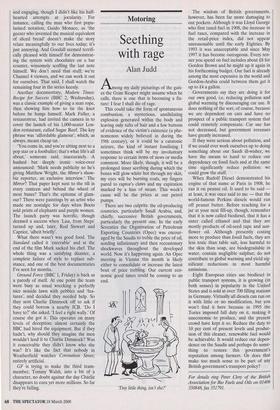Motoring
Seething with rage
Alan Judd
ong my daily picturings of the guis- es the Grim Reaper might assume when he calls, there is one that is becoming a fix- ture: I fear I shall die of rage.
This could take the form of spontaneous combustion, a mysterious, annihilating explosion generated within the body and leaving only tufts of hair and a few buttons of evidence of the victim's existence (a phe- nomenon widely believed in during the 19th century), or it could be a catatonic seizure, the kind of instant fossilising I sometimes think will be my involuntary response to certain items of news or media comment. More likely, though, it will be a prolonged inner seething during which the bones will glow white hot through my skin, my eyes will be burning coals, my fingers pared to raptor's claws and my expiration marked by a hiss of steam. This week's cause will be the prices at our petrol pumps.
There are two culprits: the oil-producing countries, particularly Saudi Arabia, and, chiefly, successive British governments, particularly the present one. In the early Seventies the Organisation of Petroleum Exporting Countries (Opec) was encour- aged by the Saudis to treble the price of oil, sending inflationary and then recessionary shockwaves throughout the developed world. Now it's happening again. An Opec meeting in Vienna this month is likely either to consolidate or increase the latest bout of price trebling. Our current eco- nomic good times could be coming to an end.
`Tiny little thing, isn't she?' The wisdom of British governments, however, has been far more damaging to our pockets. Although it was Lloyd George who first taxed fuel in 1908, the increase in fuel taxes, compared with the increase in the retail-price index, did not appear unreasonable until the early Eighties. By 1993 it was unacceptable and since May 1997 it has become outrageous. Every ten- ner you spend on fuel includes about £8 for Gordon Brown and he might up it again in his forthcoming budget. Our fuel is already among the most expensive in the world and Gordon-Arabia could between them get it up to £4 a gallon.
Governments say they are doing it for our own good, i.e. reducing pollution and global warming by discouraging car use. It does nothing of the sort, of course, because we are dependent on cars and have no prospect of a public transport system that could remotely compensate. Car use has not decreased, but government revenues have greatly increased.
If they were serious about pollution, and if we could ever work ourselves up to doing something about our Saudi ill-wisher, we have the means to hand to reduce our dependency on fossil fuels and at the same time significantly reduce pollution: we could grow the stuff.
When Rudolf Diesel demonstrated his engine of that name at Paris in 1908, he ran it on peanut oil. It used to be said — at least, it was once said to me — that the world-famous Perkins diesels would run off peanut butter. Before reaching for a jar at your next fill-up, though, remember that it is now called biodiesel, that it has a sister called ethanol and that they are mostly products of oil-seed rape and sun- flower oil. Although presently costing more to produce than fossil fuels, they are less toxic than table salt, less harmful to the skin than soap, are biodegradable in water, contain negligible sulphur, do not contribute to global warming and yield sig- nificant reductions in most harmful emissions.
Eight European cities use biodiesel in public transport systems, it is growing (in both senses) in popularity in the United States and is sold at over 700 filling stations in Germany. Virtually all diesels can run on it with little or no modification, but you won't find it here because in 1995 the Tories imposed full duty on it, making it uneconomic to produce, and the present crowd have kept it so. Reduce the duty to 10 per cent of present levels and produc- tion of this cleaner, renewable fuel would be achievable. It would reduce our depen- dence on the Saudis and perhaps do some- thing to restore this government's reputation among farmers. Or does that make too much sense to be part of any British government's transport policy?
For details ring Peter Cloy of the British Association for Bio Fuels and Oils on 01406 350848, fax 351791.


















































































 Previous page
Previous page